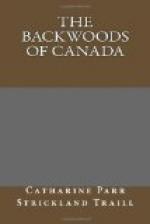I have always felt a great desire to see the nest of a humming-bird, but hitherto have been disappointed. This summer I had some beds of mignionette and other flowers, with some most splendid major convolvuluses or “morning gloves,” as the Americans call them; these lovely flowers tempted the hummingbirds to visit my garden, and I had the pleasure of seeing a pair of those beautiful creatures, but their flight is so peculiar that it hardly gives you a perfect sight of their colours; their motion when on the wing resembles the whirl of a spinning-wheel, and the sound they make is like the hum of a wheel at work; I shall plant flowers to entice them to build near us.
I sometimes fear you will grow weary of my long dull letters; my only resources are domestic details and the natural history of the country, which I give whenever I think the subject has novelty to recommend it to your attention. Possibly I may sometimes disappoint you by details that appear to place the state of the emigrant in an unfavourable light; I merely give facts as I have seen, or heard them stated. I could give you many flourishing accounts of settlers in this country; I could also reverse the picture, and you would come to the conclusion that there are many arguments to be used both for and against emigration. Now, the greatest argument, and that which has the most weight, is NECESSITY, and this will always turn the scale in the favour of emigration; and that same imperative dame Necessity tells me it is necessary for me to draw my letter to a conclusion.
Farewell, ever faithfully and affectionately, your attached sister.
LETTER XVII.
Ague.—Illness of the Family.—Probable Cause.—Root-house.—Setting in of Winter.—Insect termed a “Sawyer.”—Temporary Church.
November the 28th, 1834.
You will have been surprised, and possibly distressed, by my long silence of several months, but when I tell you it has been occasioned by sickness, you will cease to wonder that I did not write.
My dear husband, my servant, the poor babe, and myself, were all at one time confined to our beds with ague. You know how severe my sufferings always were at home with intermittents, and need not marvel if they were no less great in a country where lake-fevers and all kinds of intermittent fevers abound.
Few persons escape the second year without being afflicted with this weakening complaint; the mode of treatment is repeated doses of calomel, with castor-oil or salts, and is followed up by quinine. Those persons who do not choose to employ medical advice on the subject, dose themselves with ginger-tea, strong infusion of hyson, or any other powerful green tea, pepper, and whiskey, with many other remedies that have the sanction of custom or quackery.




